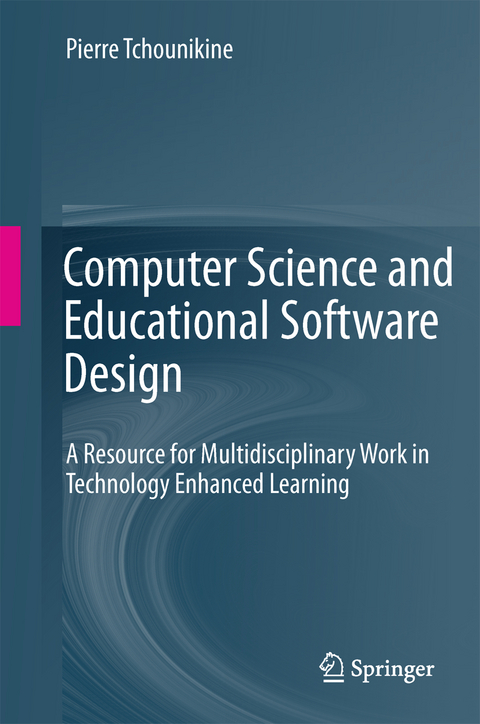
Computer Science and Educational Software Design
Springer Berlin (Verlag)
978-3-642-44312-1 (ISBN)
Developing educational software requires thinking, problematizing, representing, modeling, implementing and analyzing pedagogical objectives and issues, as well as conceptual models and software architectures. Computer scientists face the difficulty of understanding the particular issues and phenomena to be taken into account in educational software projects and of avoiding a naïve technocentered perspective. On the other hand, actors with backgrounds in human or social sciences face the difficulty of understanding software design and implementation issues, and how computer scientists engage in these tasks.
Tchounikine argues that these difficulties cannot be solved by building a kind of "general theory" or "general engineering methodology" to be adopted by all actors for all projects: educational software projects may correspond to very different realities, and may be conducted within very different perspectives and with very different matters of concern. Thus the issue of understanding each others' perspectives and elaborating some common ground is to be considered in context, within the considered project or perspective. To this end, he provides the reader with a framework and means for actively taking into account the relationships between pedagogical settings and software, and for working together in a multidisciplinary way to develop educational software.
His book is for actors engaged in research or development projects which require inventing, designing, adapting, implementing or analyzing educational software. The core audience is Master's and PhD students, researchers and engineers from computer science or human and social sciences (e.g., education, psychology, pedagogy, philosophy, communications or sociology) interested in the issues raised by educational software design and analysis and in thevariety of perspectives that may be adopted.Pierre Tchounikine, PhD, is Full Professor of Computer Science at the University of Grenoble (France). He is presently leader of Grenoble's multidisciplinary research team (40 persons) edicated to Technology Enhanced Learning (TEL). He has been involved in the construction and leadership of the European Network for Excellence Kaleidoscope (over 1.000 researchers from different disciplines involved in TEL) and is now leading Grenoble's participation to the Stellar European network. He serves in the International Society for the Learning Sciences educational committee (since 2008) and has been member of the Artificial Intelligence and Education executive committee (2003-2011). As a Computer Science re-searcher involved for 20 years in the TEL field, reviewer of many articles and projects, supervisor and reviewer of many PhD theses, he has developed a specific interest in analyzing and conceptualizing the relations and issues related to the Computer Science dimensions of TEL seen as a multidisciplinary field.
Introduction.- A General Conceptualization for Educational Software.- Understanding Differences in Perspectives.- Review of Prototypical Examples.- CS Perspectives and TEL.- Educational Software Engineering.- Characterizing the Design Context and the Software Artifact.- Methodological Considerations.- Conclusions.
From the reviews:
"This book considers the design and implementation of educational software from a theoretical point of view. ... All necessary notions for understanding the book are well defined and explained. ... The book provides a very good set of items for educational software engineering that may be used to characterize the educational setting. ... This book is for professionals engaged in research or development projects that require inventing, designing, adapting, implementing or analyzing educational software and related issues." (Thomas Borys, Zentralblatt MATH, Vol. 1245, 2012)
| Erscheint lt. Verlag | 7.10.2014 |
|---|---|
| Zusatzinfo | XIII, 180 p. |
| Verlagsort | Berlin |
| Sprache | englisch |
| Maße | 155 x 235 mm |
| Gewicht | 308 g |
| Themenwelt | Schulbuch / Wörterbuch ► Lernhilfen |
| Schulbuch / Wörterbuch ► Unterrichtsvorbereitung ► Unterrichts-Handreichungen | |
| Informatik ► Software Entwicklung ► User Interfaces (HCI) | |
| Sozialwissenschaften ► Pädagogik | |
| Schlagworte | CAI • computer assisted instruction • computer assisted learning • Educational Software • Educational technology • Pedagogical Software • Technology Enhanced Learning • TEL |
| ISBN-10 | 3-642-44312-5 / 3642443125 |
| ISBN-13 | 978-3-642-44312-1 / 9783642443121 |
| Zustand | Neuware |
| Haben Sie eine Frage zum Produkt? |
aus dem Bereich


